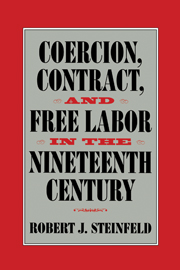Book contents
- Frontmatter
- Contents
- List of Illustrations and Tables
- Acknowledgments
- Introduction: Free Wage Labor in the History of the West
- PART ONE AMERICAN CONTRACT LABOR AND ENGLISH WAGE LABOR: THE USES OF PECUNIARY AND NONPECUNIARY PRESSURE
- 1 “Free” Contract Labor in the United States: An Anti-essentialist View of Labor Types I
- 2 “Unfree” Wage Labor in Nineteenth-Century England: An Anti-essentialist View of Labor Types II
- 3 Explaining the Legal Content of English Wage Labor
- 4 Struggles over the Rules: The Common Law Courts, Parliament, the People, and the Master and Servant Acts
- 5 Struggles under the Rules: Strategic Behavior and Historical Change in Legal Context
- 6 Struggles to Change the Rules
- 7 Freedom of Contract and Freedom of Person
- PART TWO “FREE” AND “UNFREE” LABOR IN THE UNITED STATES
- Conclusion
- Index
5 - Struggles under the Rules: Strategic Behavior and Historical Change in Legal Context
Published online by Cambridge University Press: 06 July 2010
- Frontmatter
- Contents
- List of Illustrations and Tables
- Acknowledgments
- Introduction: Free Wage Labor in the History of the West
- PART ONE AMERICAN CONTRACT LABOR AND ENGLISH WAGE LABOR: THE USES OF PECUNIARY AND NONPECUNIARY PRESSURE
- 1 “Free” Contract Labor in the United States: An Anti-essentialist View of Labor Types I
- 2 “Unfree” Wage Labor in Nineteenth-Century England: An Anti-essentialist View of Labor Types II
- 3 Explaining the Legal Content of English Wage Labor
- 4 Struggles over the Rules: The Common Law Courts, Parliament, the People, and the Master and Servant Acts
- 5 Struggles under the Rules: Strategic Behavior and Historical Change in Legal Context
- 6 Struggles to Change the Rules
- 7 Freedom of Contract and Freedom of Person
- PART TWO “FREE” AND “UNFREE” LABOR IN THE UNITED STATES
- Conclusion
- Index
Summary
Modern free wage labor is generally taken to mean labor working under agreements that are determinable at will or that are not determinable at will but in which the legal system prohibits certain remedies for breach, particularly criminal sanctions and specific performance. To the extent that employment at will was adopted in any English trade during the nineteenth century, the practice rendered criminal sanctions for contract breach irrelevant. We know something about employment at will in Britain during the 1860s from testimony given before the Select Committee appointed in 1866 to investigate possible reforms of the Master and Servant acts. The Committee members took a special interest in the practice because for them it represented a kind of social experiment, wage labor markets operating without the benefit of penal sanctions. The Committee wanted to know, in essence, whether wage labor could be profitably maintained under a system in which penal sanctions were not available to employers as it considered possible reforms of the Master and Servant acts.
MINUTE CONTRACTS
The Select Committee learned that by 1866 “minute contracts” were widespread in the Scottish coal fields. Nearly 25,000 of the 35,000 Scottish coal miners were working under such contracts. Where minute contracts had been adopted employers generally did not prosecute workers under the Master and Servant acts. The common understanding seems to have been that minute contracts were the practical equivalent of employment at will requiring no notice for termination or quitting.
- Type
- Chapter
- Information
- Coercion, Contract, and Free Labor in the Nineteenth Century , pp. 167 - 191Publisher: Cambridge University PressPrint publication year: 2001



